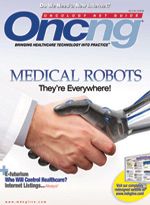The Physician Office of the Future: 2020
The Physician Office of the Future: 2020
Waiting Room Area
With these touch screen, wireless pads, you’ll be able to collect legible documentation from patients upon check-in, securely record and transfer information into electronic records, conduct customizable patient surveys, and provide educational materials and practice updates to your patients while they sit in the waiting room.
Improve medication adherence by sending prescription information from your practice management system or EMR right to an
automatic drug dispenser; patients can conveniently receive their needed medications right in your office and in just a few minutes!
Bathroom
Universal ToiletWhen using a universal toilet, your patients with disabilities will appreciate not having to do the usual twisting and turning that’s
required to maneuver from a wheelchair to a standard toilet. They’ll be able to slide forward off a wheelchair directly onto the toilet, receiving support and comfort from an optional chest board. Your general patient population can use it too.
Front Desk AreaMonitor-Docking Notebook
Your staff can access patients’ information from a notebook computer, by sliding it into a slot behind a desktop’s LCD display,
freeing up desk space needed for a typical docking system and allowing the user to use the laptop’s screen as a second display.
Multi-functional DeskBring your office with you to and from the hospital or clinic and between exam rooms with this compact unit on wheels, which
conceals a small workstation for laptop users and several drawers for all your supplies.
Exam Room
VeriMed InserterUse this device to insert the VeriMed Microchip—a tiny RFID device that quickly provides emergency rooms with access to
a patient’s vital personal health information when they’re incapacitated—into the back of a patient’s upper arm.
No Contact ThermometerYou’ll be able to take safe, accurate readings while keeping patients happy with this thermometer that’s held in front of their
forehead, armpit, or naval. Sleeping infants don’t even need to wake up!
Ancillary Care Room
With continuing increases in practice overhead and flat physician salaries, more physicians may turn to niche services, like
hair (a), spider vein (b), and tattoo removal (c), in order to bring in extra revenue.
Melanoma Monitoring DeviceMonitoring patient’s lesions is easy with this device, which “allows for rapid acquisition and processing of patient and lesion data,” as well as easy storage and retrieval for comparison during future visits.
Genetic Counseling Room
The increasing focus on providing individualized care will require an increased use of genetic testing, a niche service already gaining steam thanks to companies like Myriad Pharmaceuticals and DNA Direct. To stay up to speed, you’ll need to jump on the genetic testing wagon and get yourself some collection kits.
What Was The File Room
Wall-Size, Touch-Screen ComputerThe way of life portrayed in Total Recall may not be so far-fetched. Soon, we’ll be able to install giant touch-screen displays in the walls of our homes and offi ces, integrating every imaginable facet of our work and home lives into one seamless system. Watch the video, and be dazzled! This technology will be here before you know it.
Server
You’ll need a hefty server for your EMR system, which will be seamlessly integrated with patients’ personal health records, local pharmacies (should you decide to not get a drug ATM), hospitals and other health networks, and national and international
databases and data warehouses that track health outcomes and other quality indicators.
Telehealth equipment
You’ll need video and other telehealth gear to consult with your increasingly busy patients, who won’t have to time for routine
appointments, and colleagues.
In order to take advantage of more powerful 3D medical imaging software, you’ll need a 3D mouse that allows you to fully explore the images in every direction.
